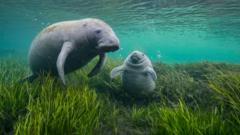Manatee mum and calf charm wildlife photo judges
Conservation success story: a manatee with its calf in Florida
Maddie Molloy
BBC News Climate and Science
A manatee and its calf drift underwater in Hunter Springs, Florida.
An algal bloom in the area had caused a decline in the eelgrass beds that provide them with food, but the local community restored the habitat, resulting in more manatees being recorded than ever before.
The photo taken by Dr Jason Gulley, who is also a geologist, is among several highly commended in this year’s Wildlife Photographer of the Year.
The competition’s winning photographs will be announced on 8 October, followed by an exhibition at the Natural History Museum, showcasing 100 photographs.
Scroll down to hear more from Jason and see some of the other highly commended photographs.
Sea cow success story
Jason told the BBC in an interview that he doesn’t normally take photos for competitions.
Manatees are large aquatic mammals commonly known as sea cows.
All three manatee species are listed as vulnerable to extinction due to a variety of threats including boat collisions, hunting and habitat destruction.
“The first time I got into the water with manatees, I saw them being super playful with each other. They were curious and inquisitive,” he said.
“There was one manatee that became super curious about me, and he would leave the other group of manatees and walk on his flippers, and he’d get about halfway towards me and then run back to the group on his flippers.
“A couple of minutes later, he’d come just a little bit closer and then go back, and it just reminded me of experiences like at a dog park.”
“I’ve never seen photographs that capture this behaviour,” Jason said. “I went in to get a few pictures for a project on environmental impacts and conservation, but I got obsessed.”
Leaving the Nest by Sasha Jumanca, Germany/Romania
Image source, Sasha Jumanca
Sasha had been watching these tawny owlets for several days in a park near his home. He had seen tawny owls in the neighbourhood before but was surprised to discover these so close to the heart of the city.
Highly Commended, 10 Years and Under
Location: Maximiliansanlagen, Munich, Germany
Twist and Jump by Jose Manuel Grandío, Spain
Image source, Jose Manuel Grandío
Jose saw this stoat jump mid-air as an “expression of exuberance” as the small mammal hurled itself around in a fresh snowfall.
Highly Commended, Behaviour: Mammals
Location: Athose, Bourgogne-Franche-Comté, France
Deadly Bite by Ian Ford, UK
The radio alerted Ian that a jaguar had been spotted prowling a tributary of the São Lourenço river. Kneeling in the boat, he was in the perfect position when the cat delivered the skull-crushing bite to the unsuspecting yacare caiman.
Highly Commended, Behaviour: Mammals
Location: Pantanal, Mato Grosso, Brazil
Moonlight Hunter by Xingchao Zhu, China
Image source, Xingchao Zhu
During Chinese New Year, Xingchao tracked a group of Pallas’s cats on the frozen plateau of Inner Mongolia. Before dawn, Xingchao made eye contact with this cat, just as it caught a bird.
Category – Highly Commended, Behaviour: Mammals
Location: Hulun Buir, Inner Mongolia, China
Ziggy Spider by Lam Soon Tak, Malaysia
Image source, Lam Soon Tak
As Lam Soon Tak explored the highlands of Malaysia, he came across this spider, Heteropoda davidbowie, named in 2008 by arachnologist and Bowie fan Dr Peter Jägerthe. Perched on broken branches beside a river, its orange body stood out against the lush green moss.
Highly Commended, Behaviour: Invertebrates
Location: Cameron Highlands, Pahang, Malaysia
Going with the Floe by Tamara Stubbs, UK
Image source, Tamara Stubbs
A standout moment on Tamara’s nine-week expedition in Antarctica’s Weddell Sea was when two seals bobbed up to the surface to take a deeper breath after falling asleep alongside the ship.
Highly Commended, Animals in their Environment
Location: Weddell Sea, Antarctica
Strength in Numbers by Theo Bosboom, The Netherlands
Image source, Theo Bosboom
Mussels bind themselves to rocks or other mussels on the ocean floor using their hair-like ‘beards’, also called byssal threads. Theo likes to take pictures of species that are not considered beautiful or important, to highlight their unappreciated significance.
Highly Commended, Animals in their Environment
Location: Praia da Ursa, Sintra, Portugal
The Disappearing Ice Cap by Thomas Vijayan, Canada
Image source, Thomas Vijayan
Thomas used his drone to capture this image, which is a stitched panorama of 26 individual frames, to provide a spectacular view of meltwater plunging over the edge of the Bråsvellbreen glacierglacier.
Highly Commended, Oceans: The Bigger Picture
Location: Svalbard, Norway
Hooked by Tommy Trenchard, South Africa
Image source, Tommy Trenchard
On the Greenpeace ship Arctic Sunrise, Tommy photographed a requiem shark, its body arched in a final act of resistance. He was on a research expedition to document bycatch or accidental capture of sharks by tuna and swordfish fishing boats.
Highly Commended, Oceans: The Bigger Picture
Location: International waters, South Atlantic Ocean
In the Spotlight by Shreyovi Mehta, India
Image source, Shreyovi Mehta
Shreyovi spotted the two Indian peafowl while walking in the forest with her parents.
Runner-Up, 10 Years and Under.
Location: Keoladeo National Park, Rajasthan, India
All photos subject to copyright.
You can see Highly Commended photographs from all of the categories at the Natural History Museum website, external.

